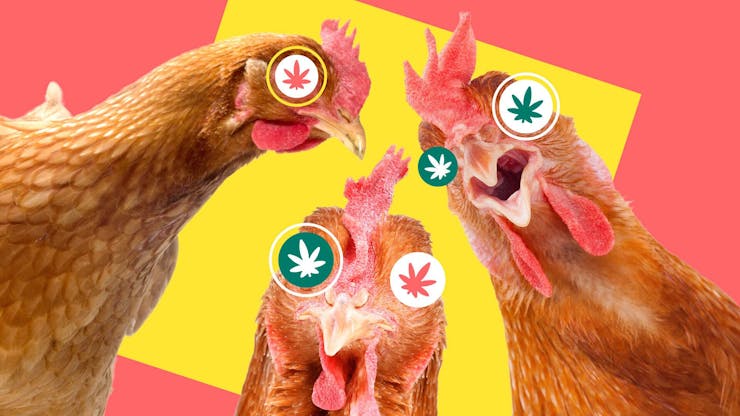A farm in Northern Thailand reports better meat, less disease, and more weather-resilient chickens after using cannabis in their food.
Could cannabis make chickens faster, better, stronger? One farm in Thailand is investigating the potential health benefits of administering the plant.
Thailand was the first Asian country to legalize medical marijuana in 2018 and continues to be at the forefront of destigmatization and social change. They are continuing to be dank disrupters, this time making headlines by using cannabis in chicken feed.
Leftover pot leaves inspire innovation in Lampang
A farmer in the northern region of Lampang, who is licensed to grow medical cannabis, was curious about what to do with all the extra biomass after his cannabis harvest. Ong-ard Panyachatiraksa decided, with the support of Thailand’s Chiang Mai University, to try using cannabis leaves for a group of chickens that weren’t responding to antibiotics for avian bronchitis.
According to The Guardian, academics at the university have been studying 1,000 chickens since last January at the farm to see how the animals responded when cannabis was mixed into their feed or water. They used leftover leaves, crushed into feed or boiled for “marijuana water”.
Stoned for science? Not really. The chickens weren’t given quantities that would (likely) cause psychoactive effects like being high.
While the completed research has yet to be published, Chompunut Lumsangkul, assistant professor at Chiang Mai University’s Department of Animal and Aquatic sciences, says the chickens given cannabis had higher quality meat and eggs, needed fewer antibiotics (or none at all!) and were more resilient to inclement weather.
In addition to the perceived health benefits, these coveted weed chickens also fetch a higher price at local farmers’ markets. According to Panyachatiraksa, chickens generally sell for 60 baht ($1.70 USD) per kg, but his chickens are selling for double.
Medicinal cannabis is part of holistic Thai tradition
“It is the local wisdom of Thai people to use cannabis [leaves] as a food additive – mixing it as an ingredient to make chicken noodles. People put it in the soup to make it taste better,” says Lumsangkul, wanting to understand the science behind the practice.
Panyachatiraksa notes the price of cannabis is still too high in Thailand for farms to easily incorporate it into chicken feed, but that recent legal reforms may change that. “As time goes by and we can grow more, it’s going to get better,” he said.
The study comes at an important time, as Thailand’s National Farmers Council warns that antibiotics in chicken and eggs can harm consumers’ health, possibly causing allergies and declining immunity. Cannabis, unlike antibiotics, doesn’t appear to leave remnants in the food people consume. At least, in these doses.
Shop highly rated dispensaries near you
Showing you dispensaries nearCould cannabis help reduce dependence on antibiotics?
Further research is needed to understand this correlation better. Lumsangkul, who lead the first study, notes there isn’t enough data yet to know if cannabis can replace antibiotics in chicken farming.
Lumsangkul is planning a second study where she will investigate high-potency cannabis extracts to test their impact on disease and fatality rates among chickens.
For Lumsangkul, if the results are confirmed, cannabis could become an important tool for transforming the poultry industry both in Thailand, as well as internationally. Antibiotics in meat have long been a topic of discussion, as more research shows potential health concerns.





